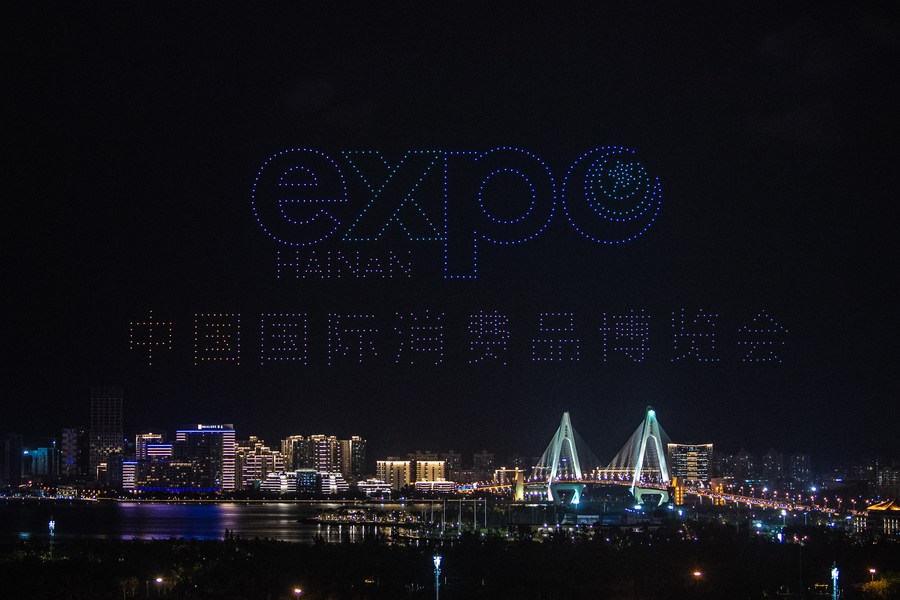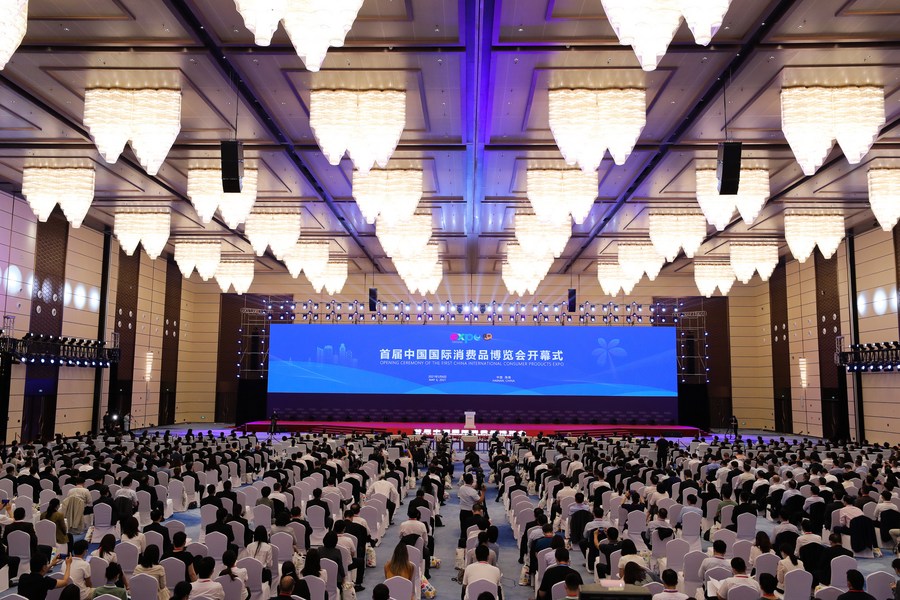
Staff do preparation work at the Hainan International Convention and Exhibition Center in Haikou, capital of South China's Hainan province, May 6, 2021. The first China International Consumer Products Expo will be held here from May 7 to 10. [Photo/Xinhua]
HAIKOU - The inaugural China International Consumer Products Expo (CICPE) kicked off on Thursday in Haikou, capital of the southern island province of Hainan, pooling global high-end consumer brands to tap into the second-largest economy's market potential.
Chinese President Xi Jinping sent a congratulatory message to the expo. He said the expo, serving as a global platform of displaying and trading high-end consumer products, is conducive to all countries sharing opportunities provided by the Chinese market and conducive to global economic recovery and growth.
The CICPE will also enable China to offer the world more quality consumer products, Xi said.
China is ready to give play to the advantages brought by the Hainan free trade port in comprehensively deepening reforms and putting up the highest-level opening-up policies on a trial basis, he added.
From the Canton Fair in Guangdong, the import-themed expo in Shanghai, the fair on trade in services in Beijing, to the CICPE, China has taken holding high-end international expos as one of the most effective ways to share its development opportunities with the rest of the world.
The CICPE, the first-ever expo focusing on consumer goods held by China, is expected to attract more than 200,000 visitors from home and abroad.

Photo taken on May 6, 2021 shows a drone performance for the first China International Consumer Products Expo in Haikou, capital of South China's Hainan province. The expo will be held in Haikou from May 7 to 10. [Photo/Xinhua]
A chord of free trade
Listed as a new annual expo at the national level, the CICPE has attracted 648 overseas companies and 1,365 brands from 69 countries and regions.
Slated for May 7-10, the expo covers 80,000 square meters, including 60,000 square meters of international exhibition space featuring products including cosmetics, automobiles, yachts, and garments.
The event is the first international expo held in Hainan since China released a master plan last June to build the island province into a globally influential and high-level free trade port by the middle of the century.
The master plan also blueprinted that Hainan should strive to build itself into an international tourism and consumption center. The hosting of the CICPE is a practical move to achieve this goal, according to vice commerce minister Wang Bingnan.
Over the years, China has made consistent efforts to share its market opportunities with the rest of the world by holding such business matching expos, honoring its commitment to open cooperation.
Coming at a time when anti-globalization, unilateralism, and protectionism sentiments are rising, the very first China International Import Expo (CIIE) is witnessing the strengthening of business ties and increasing support for free trade.
Held in 2018 in Shanghai, the first CIIE attracted the participation of more than 3,600 companies from 172 countries and regions, with intended deals worth $57.8 billion.
At the expo, China announced a slew of opening-up measures, including further cutting import duties, relaxing market access for foreign investment, and implementing the system of pre-establishment national treatment plus a negative list, which have all taken place.
Despite disruptions by the COVID-19 pandemic last year, the third CIIE was held as scheduled and sealed higher deals than the previous events, with the intended one-year purchases of goods and services totaling $72.62 billion.
Also, in 2020, the country hosted the China International Fair for Trade in Services (CIFTIS) in Beijing, sending another clear signal of its unwavering determination to open up wider to the world.
Authorities announced at the CIFTIS that the country would develop open platforms for the pilot program of innovative development of the services sector, further ease market access for the sector, and take improved initiatives to increase quality services imports.
As the first major international economic and trade event held by China since the outbreak of COVID-19, last year's CIFTIS attracted 22,000 firms and institutions from 148 countries and regions, including 199 Fortune 500 companies.
On April 25, the 129th session of the China Import and Export Fair, also known as the Canton Fair, concluded online. It is the third time the fair occurred online.
A total of 26,000 participating companies submitted more than 2.76 million exhibits, which is 290,000 more than that of the previous session.

Photo taken on May 6, 2021 shows the opening ceremony of the first China International Consumer Products Expo in Haikou, capital of South China's Hainan province. The expo, which opened on Thursday in Haikou, will see the participation of nearly 1,500 enterprises from around 70 countries and regions. [Photo/Xinhua]
A sea of opportunities
From Canton Fair, CIIE, and CIFTIS to CICPE, China aims to turn its market into a global market, a market shared by all, and a market accessible to all.
With a total population of over 1.4 billion and more than 400 million middle-income residents, China has become the world's most promising consumer market.
Official data showed that despite impacts from COVID-19 last year, China's imports of consumer products rose by 8.2 percent year on year to 1.57 trillion yuan (about $241.9 billion).
As the broader economy continues to recover on a firm footing, China's retail sales of consumer goods, a major indicator of consumption strength, picked up further. In the first quarter, its retail sales increased by 33.9 percent year on year to 10.5 trillion yuan.
In the next 15 years, the country expects to import $30 trillion worth of goods and $10 trillion worth of services.